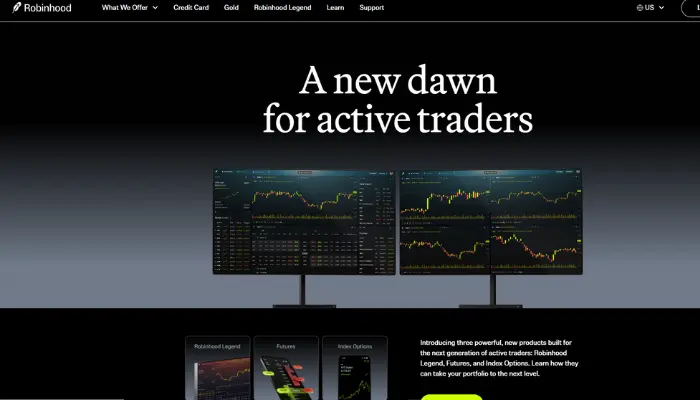Robinhood Broker Review: Features, Fees, and Pros & Cons
Robinhood has revolutionized the financial market by democratizing access to commission-free investments, attracting millions of new investors.
Advertisements
If you want to learn more about the main features, fees, security, and functionalities of Robinhood, as well as its alternatives and educational resources, you’ve come to the right place. In this article, we’ll cover all of this clearly and objectively.
Advertisements
Fees and Commissions
One of Robinhood’s biggest draws is the lack of commission fees for stocks, ETFs, and cryptocurrencies. This structure is especially appealing to those who want to invest without incurring additional costs, a competitive differentiator for the platform.
However, it’s essential to understand the extra costs that may arise in certain transactions and consider all the details to make an informed decision.
Advertisements
How Does Robinhood Make Money?
Despite not charging brokerage fees, Robinhood generates revenue primarily through two streams:
- Payment for Order Flow: Robinhood sells its users’ order data to large financial institutions, which execute these orders and pay Robinhood for this information.
- Robinhood Gold: A subscription service offering additional features, such as margin investing and real-time market data.
These practices can be controversial for some investors, so it’s essential to understand them before opening an account on the platform.
Security and Reliability

Like any investment platform, security is a priority. Robinhood has several security measures to protect users’ data and funds, including two-factor authentication (2FA) and SIPC (Securities Investor Protection Corporation) insurance, which covers up to $500,000 in case of brokerage insolvency.
Points to Consider
While Robinhood is technically secure, the brokerage faced criticism for stability issues during high-volatility events, such as the GameStop incident in 2021. During situations like these, the platform experienced outages, impacting users’ ability to buy and sell assets at crucial moments.
Additionally, the practice of selling order flow data raises discussions about conflicts of interest, as the institutions purchasing this data can profit from Robinhood’s mass of retail investors’ trades.
Platform Features
Robinhood stands out for its user-friendly, intuitive interface, ideal for beginner investors. The platform offers a range of features designed to simplify the trading experience, including buying and selling stocks, ETFs, options, and cryptocurrencies.
Key Features
- Trading Stocks, ETFs, and Cryptocurrencies: Robinhood allows users to trade these assets without additional costs.
- Fractional Shares: Investors can buy fractional shares, allowing them to invest in large companies with smaller amounts.
- Notifications and Alerts: The platform sends real-time updates on the market performance and stocks of interest to the user.
- Robinhood Gold: A subscription service offering access to in-depth analyses, investment margin, and market data.
This range of features simplifies new investors’ experiences, enabling them to learn and execute financial transactions with ease.
Account Opening Process
Opening a Robinhood account is designed to be a quick, straightforward experience, ideal for both new and seasoned investors. With a fully online setup, Robinhood makes the account creation process as seamless as possible, so users can start trading within days.
The platform’s focus on ease of access means you can complete all steps from your computer or smartphone, with just a few personal details and documents for verification.
- Download the app or visit the Robinhood website, then click on “Sign Up.”
- Enter your personal information including name, address, email, and Social Security Number (SSN), which is required to verify your identity and comply with regulations.
- Answer questions about your investment experience: Robinhood will ask about your financial knowledge and risk tolerance to better customize your experience.
- Submit verification documents: Generally, a photo of a government-issued ID like a driver’s license or passport is sufficient.
- Wait for approval: Verification can take a few days, and once approved, you’ll be ready to deposit funds and start investing.
This intuitive process allows users to open an account without complications, supporting a smooth onboarding experience for investors at all levels.
Alternatives to Robinhood
For investors outside the United States or those looking to explore other options, there are interesting alternatives offering similar functionalities to Robinhood. Let’s explore some:
- eToro: Available in several countries, including Brazil, eToro offers a platform with stock, ETF, and cryptocurrency trading, plus Copy Trading, which allows users to replicate trades from experienced investors.
- Interactive Brokers: Ideal for experienced investors, this brokerage offers a vast range of assets and markets, with competitive brokerage costs.
- Webull: Another zero-commission alternative with similar functionalities to Robinhood, but with a more robust interface for active traders.
These platforms can be great options for those looking for alternatives that meet the same needs offered by Robinhood.
Updates and Expansions
Robinhood is evolving to meet its users’ needs with new features and a wider reach. Recently, it expanded to the United Kingdom, aiming for a global presence.
Key updates include cryptocurrency options trading and automated investments, offering users more variety in how they manage their portfolios.
Recent Major Updates
- Desktop Platform: A new desktop version allows users to monitor and trade on larger screens.
- Futures and Cryptocurrency Indices: Robinhood plans to add futures and crypto index trading, widening its product range.
- Robinhood Retirement: Now offering retirement accounts like IRAs, Robinhood supports users’ long-term financial planning.
These advancements underscore Robinhood’s commitment to adapting to investors’ evolving needs and preferences.
Financial Education and Learning Resources
For those starting in the world of investing, Robinhood offers a variety of educational resources. The platform provides easily accessible materials that help users learn about the financial market, including:
- Articles and Tutorials: Informative content on different types of investments, risks, and long-term strategies.
- Podcast “Robinhood Snacks”: A daily podcast covering major economic news and market trends in a relaxed style.
- Interactive Lessons: With materials on basic financial concepts, including explanations on stocks, cryptocurrencies, and ETFs.
These resources are particularly helpful for those who want to learn while investing, promoting greater independence and confidence in their investments.
Robinhood stands out as one of the most accessible and revolutionary brokerages in the market, offering a commission-free experience that attracts millions of new investors.
With robust functionalities, a simplified account opening process, and a competitive fee structure, the platform facilitates new investors’ entry into the financial market.
However, it’s important to be mindful of some limitations, such as the lack of customer support for non-US residents and the sale of order data to large institutions. Evaluating alternatives like eToro and Interactive Brokers may be a wise choice, depending on your needs and location.
Now that you know all the details about Robinhood, from fees and functionalities to learning resources, you can make an informed decision about whether or not to use the platform.





